Leadership and Management in Uber: Operational Approaches Analysis
VerifiedAdded on 2023/01/03
|12
|4185
|45
Report
AI Summary
This report provides a comprehensive analysis of Uber's leadership, management, and operational strategies. It begins by defining and comparing the roles and characteristics of leaders and managers, using Uber as a case study. The report then examines how leadership and management functions apply in different situational contexts, such as conflict management and service launches. Different theories and models are explored, including situational leadership, system leadership, and contingency leadership, with practical applications within Uber's operational framework. The key approaches to operations management are explained, highlighting the roles of leaders and managers in implementing these approaches. Finally, the report discusses the factors of the business environment that affect operational management and decision-making, offering a complete overview of Uber's operational dynamics. The report discusses Uber's operational management including lean operations, and the roles of managers and leaders in this field.
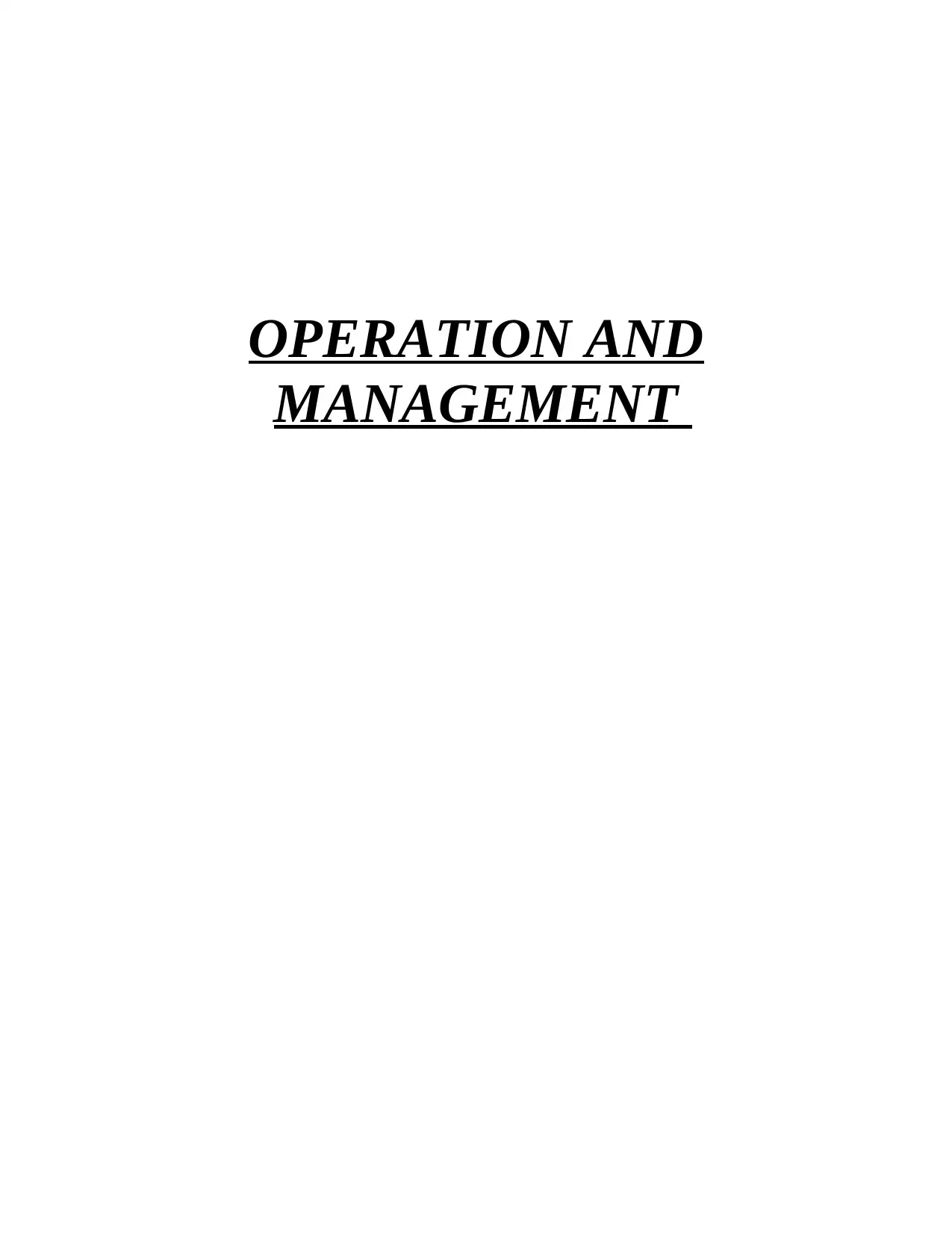
OPERATION AND
MANAGEMENT
MANAGEMENT
Paraphrase This Document
Need a fresh take? Get an instant paraphrase of this document with our AI Paraphraser
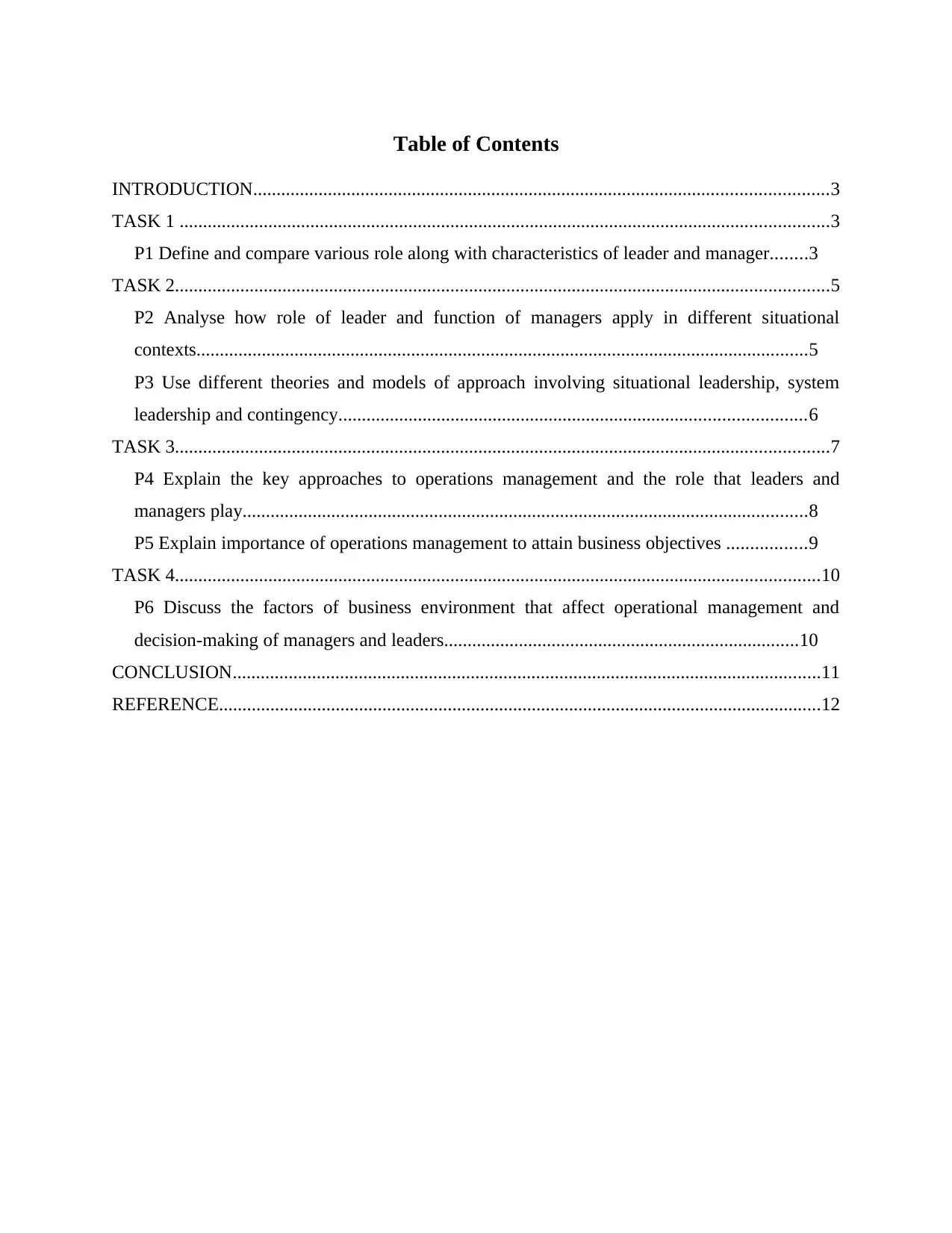
Table of Contents
INTRODUCTION...........................................................................................................................3
TASK 1 ...........................................................................................................................................3
P1 Define and compare various role along with characteristics of leader and manager........3
TASK 2............................................................................................................................................5
P2 Analyse how role of leader and function of managers apply in different situational
contexts...................................................................................................................................5
P3 Use different theories and models of approach involving situational leadership, system
leadership and contingency....................................................................................................6
TASK 3............................................................................................................................................7
P4 Explain the key approaches to operations management and the role that leaders and
managers play.........................................................................................................................8
P5 Explain importance of operations management to attain business objectives .................9
TASK 4..........................................................................................................................................10
P6 Discuss the factors of business environment that affect operational management and
decision-making of managers and leaders............................................................................10
CONCLUSION..............................................................................................................................11
REFERENCE.................................................................................................................................12
INTRODUCTION...........................................................................................................................3
TASK 1 ...........................................................................................................................................3
P1 Define and compare various role along with characteristics of leader and manager........3
TASK 2............................................................................................................................................5
P2 Analyse how role of leader and function of managers apply in different situational
contexts...................................................................................................................................5
P3 Use different theories and models of approach involving situational leadership, system
leadership and contingency....................................................................................................6
TASK 3............................................................................................................................................7
P4 Explain the key approaches to operations management and the role that leaders and
managers play.........................................................................................................................8
P5 Explain importance of operations management to attain business objectives .................9
TASK 4..........................................................................................................................................10
P6 Discuss the factors of business environment that affect operational management and
decision-making of managers and leaders............................................................................10
CONCLUSION..............................................................................................................................11
REFERENCE.................................................................................................................................12
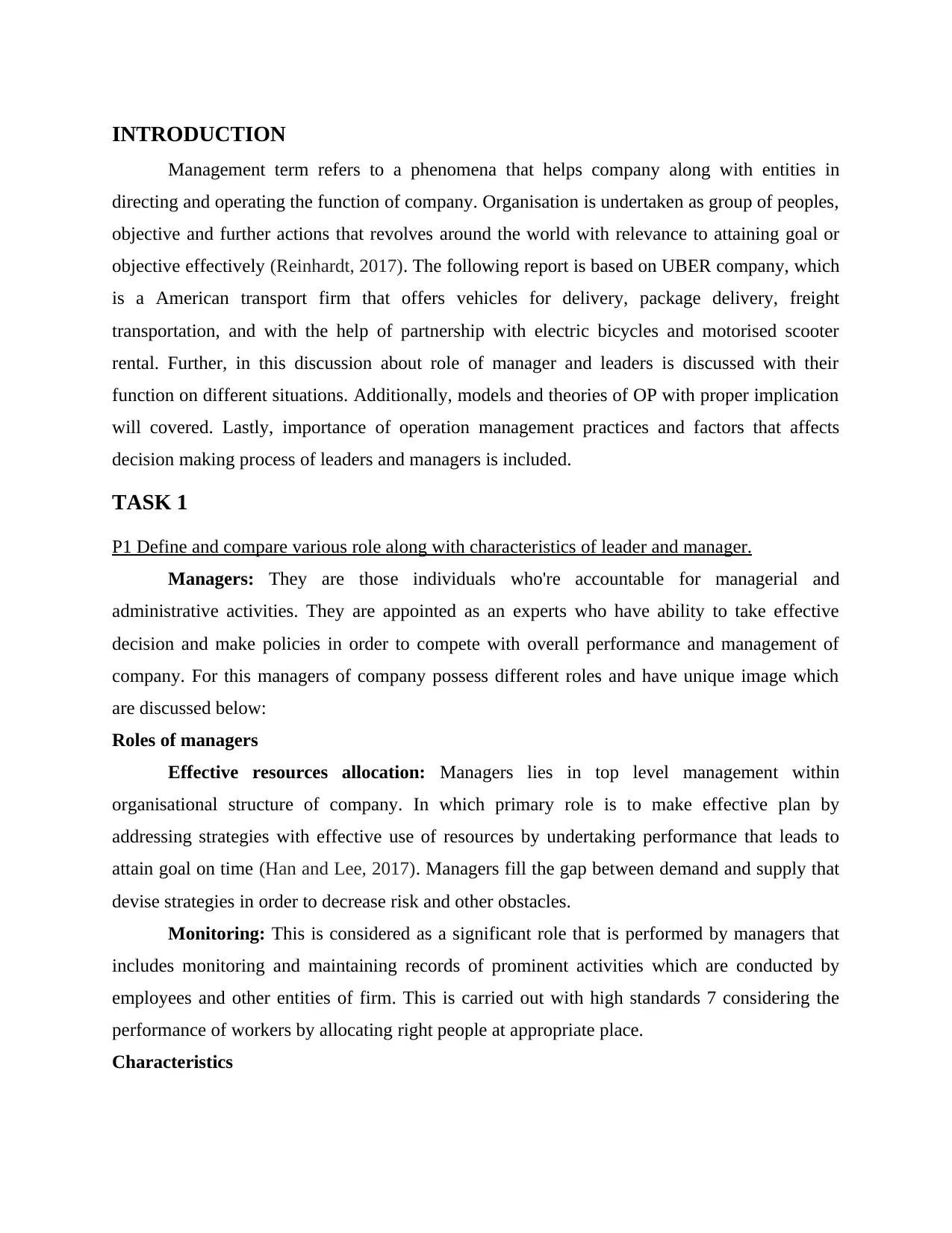
INTRODUCTION
Management term refers to a phenomena that helps company along with entities in
directing and operating the function of company. Organisation is undertaken as group of peoples,
objective and further actions that revolves around the world with relevance to attaining goal or
objective effectively (Reinhardt, 2017). The following report is based on UBER company, which
is a American transport firm that offers vehicles for delivery, package delivery, freight
transportation, and with the help of partnership with electric bicycles and motorised scooter
rental. Further, in this discussion about role of manager and leaders is discussed with their
function on different situations. Additionally, models and theories of OP with proper implication
will covered. Lastly, importance of operation management practices and factors that affects
decision making process of leaders and managers is included.
TASK 1
P1 Define and compare various role along with characteristics of leader and manager.
Managers: They are those individuals who're accountable for managerial and
administrative activities. They are appointed as an experts who have ability to take effective
decision and make policies in order to compete with overall performance and management of
company. For this managers of company possess different roles and have unique image which
are discussed below:
Roles of managers
Effective resources allocation: Managers lies in top level management within
organisational structure of company. In which primary role is to make effective plan by
addressing strategies with effective use of resources by undertaking performance that leads to
attain goal on time (Han and Lee, 2017). Managers fill the gap between demand and supply that
devise strategies in order to decrease risk and other obstacles.
Monitoring: This is considered as a significant role that is performed by managers that
includes monitoring and maintaining records of prominent activities which are conducted by
employees and other entities of firm. This is carried out with high standards 7 considering the
performance of workers by allocating right people at appropriate place.
Characteristics
Management term refers to a phenomena that helps company along with entities in
directing and operating the function of company. Organisation is undertaken as group of peoples,
objective and further actions that revolves around the world with relevance to attaining goal or
objective effectively (Reinhardt, 2017). The following report is based on UBER company, which
is a American transport firm that offers vehicles for delivery, package delivery, freight
transportation, and with the help of partnership with electric bicycles and motorised scooter
rental. Further, in this discussion about role of manager and leaders is discussed with their
function on different situations. Additionally, models and theories of OP with proper implication
will covered. Lastly, importance of operation management practices and factors that affects
decision making process of leaders and managers is included.
TASK 1
P1 Define and compare various role along with characteristics of leader and manager.
Managers: They are those individuals who're accountable for managerial and
administrative activities. They are appointed as an experts who have ability to take effective
decision and make policies in order to compete with overall performance and management of
company. For this managers of company possess different roles and have unique image which
are discussed below:
Roles of managers
Effective resources allocation: Managers lies in top level management within
organisational structure of company. In which primary role is to make effective plan by
addressing strategies with effective use of resources by undertaking performance that leads to
attain goal on time (Han and Lee, 2017). Managers fill the gap between demand and supply that
devise strategies in order to decrease risk and other obstacles.
Monitoring: This is considered as a significant role that is performed by managers that
includes monitoring and maintaining records of prominent activities which are conducted by
employees and other entities of firm. This is carried out with high standards 7 considering the
performance of workers by allocating right people at appropriate place.
Characteristics
⊘ This is a preview!⊘
Do you want full access?
Subscribe today to unlock all pages.

Trusted by 1+ million students worldwide
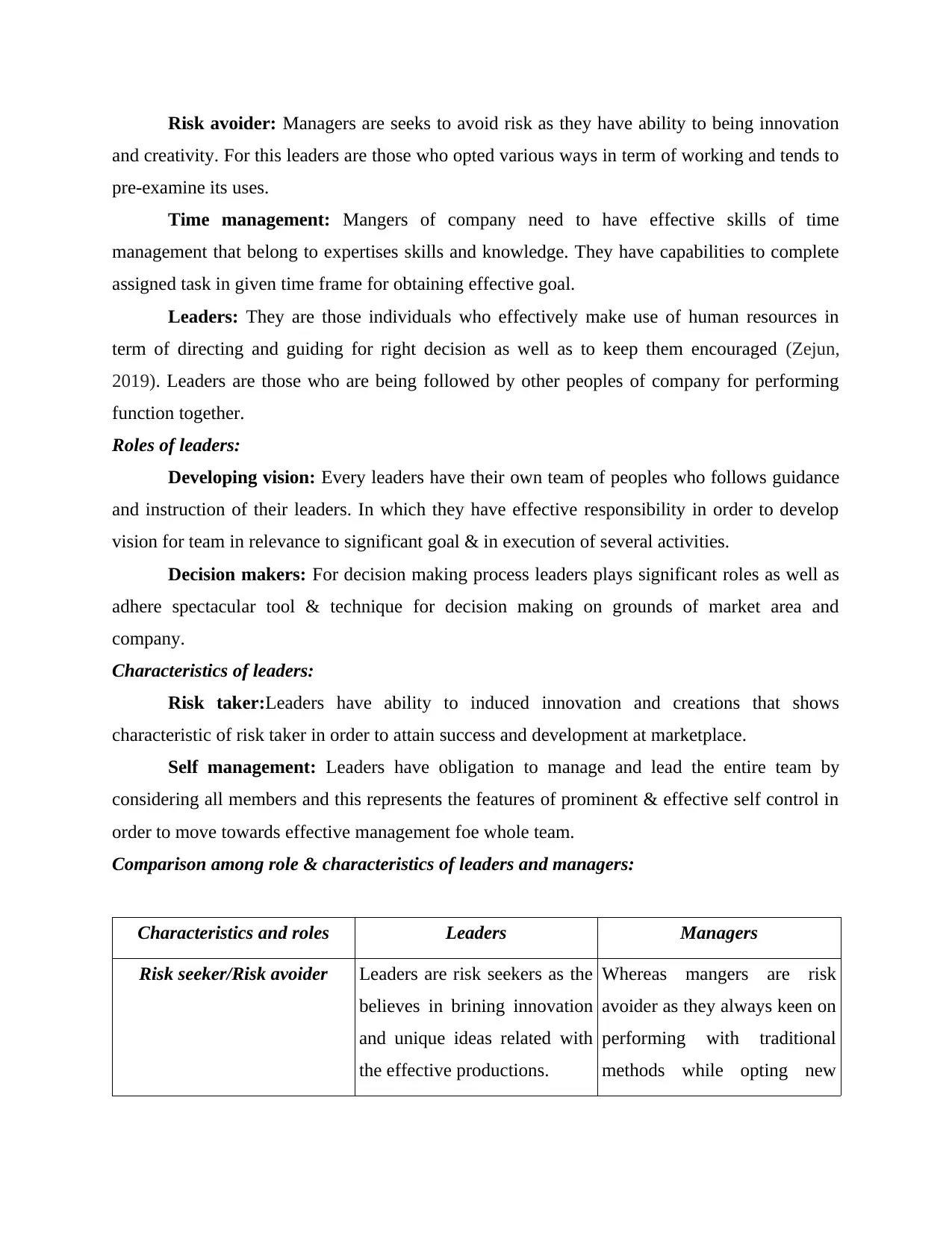
Risk avoider: Managers are seeks to avoid risk as they have ability to being innovation
and creativity. For this leaders are those who opted various ways in term of working and tends to
pre-examine its uses.
Time management: Mangers of company need to have effective skills of time
management that belong to expertises skills and knowledge. They have capabilities to complete
assigned task in given time frame for obtaining effective goal.
Leaders: They are those individuals who effectively make use of human resources in
term of directing and guiding for right decision as well as to keep them encouraged (Zejun,
2019). Leaders are those who are being followed by other peoples of company for performing
function together.
Roles of leaders:
Developing vision: Every leaders have their own team of peoples who follows guidance
and instruction of their leaders. In which they have effective responsibility in order to develop
vision for team in relevance to significant goal & in execution of several activities.
Decision makers: For decision making process leaders plays significant roles as well as
adhere spectacular tool & technique for decision making on grounds of market area and
company.
Characteristics of leaders:
Risk taker:Leaders have ability to induced innovation and creations that shows
characteristic of risk taker in order to attain success and development at marketplace.
Self management: Leaders have obligation to manage and lead the entire team by
considering all members and this represents the features of prominent & effective self control in
order to move towards effective management foe whole team.
Comparison among role & characteristics of leaders and managers:
Characteristics and roles Leaders Managers
Risk seeker/Risk avoider Leaders are risk seekers as the
believes in brining innovation
and unique ideas related with
the effective productions.
Whereas mangers are risk
avoider as they always keen on
performing with traditional
methods while opting new
and creativity. For this leaders are those who opted various ways in term of working and tends to
pre-examine its uses.
Time management: Mangers of company need to have effective skills of time
management that belong to expertises skills and knowledge. They have capabilities to complete
assigned task in given time frame for obtaining effective goal.
Leaders: They are those individuals who effectively make use of human resources in
term of directing and guiding for right decision as well as to keep them encouraged (Zejun,
2019). Leaders are those who are being followed by other peoples of company for performing
function together.
Roles of leaders:
Developing vision: Every leaders have their own team of peoples who follows guidance
and instruction of their leaders. In which they have effective responsibility in order to develop
vision for team in relevance to significant goal & in execution of several activities.
Decision makers: For decision making process leaders plays significant roles as well as
adhere spectacular tool & technique for decision making on grounds of market area and
company.
Characteristics of leaders:
Risk taker:Leaders have ability to induced innovation and creations that shows
characteristic of risk taker in order to attain success and development at marketplace.
Self management: Leaders have obligation to manage and lead the entire team by
considering all members and this represents the features of prominent & effective self control in
order to move towards effective management foe whole team.
Comparison among role & characteristics of leaders and managers:
Characteristics and roles Leaders Managers
Risk seeker/Risk avoider Leaders are risk seekers as the
believes in brining innovation
and unique ideas related with
the effective productions.
Whereas mangers are risk
avoider as they always keen on
performing with traditional
methods while opting new
Paraphrase This Document
Need a fresh take? Get an instant paraphrase of this document with our AI Paraphraser
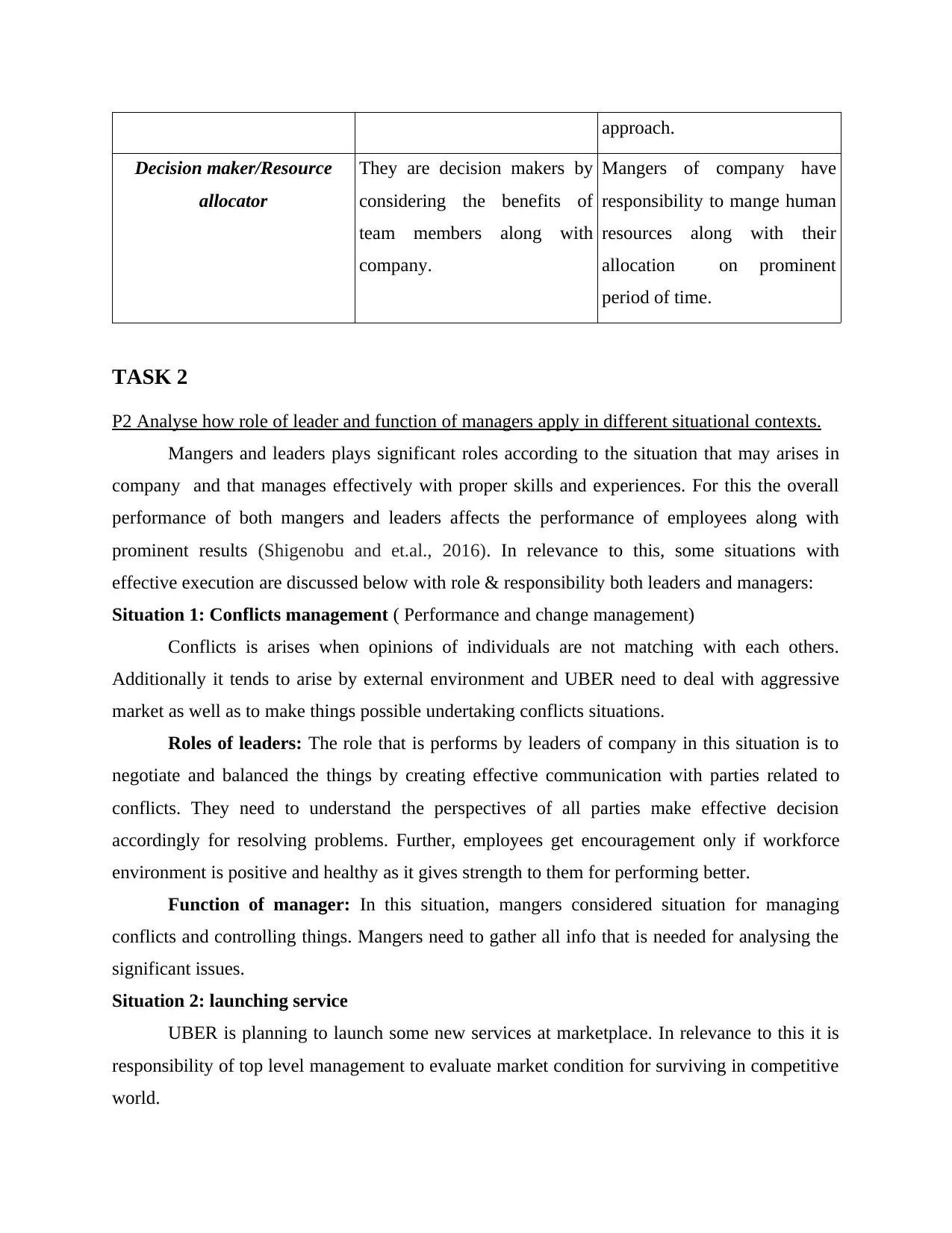
approach.
Decision maker/Resource
allocator
They are decision makers by
considering the benefits of
team members along with
company.
Mangers of company have
responsibility to mange human
resources along with their
allocation on prominent
period of time.
TASK 2
P2 Analyse how role of leader and function of managers apply in different situational contexts.
Mangers and leaders plays significant roles according to the situation that may arises in
company and that manages effectively with proper skills and experiences. For this the overall
performance of both mangers and leaders affects the performance of employees along with
prominent results (Shigenobu and et.al., 2016). In relevance to this, some situations with
effective execution are discussed below with role & responsibility both leaders and managers:
Situation 1: Conflicts management ( Performance and change management)
Conflicts is arises when opinions of individuals are not matching with each others.
Additionally it tends to arise by external environment and UBER need to deal with aggressive
market as well as to make things possible undertaking conflicts situations.
Roles of leaders: The role that is performs by leaders of company in this situation is to
negotiate and balanced the things by creating effective communication with parties related to
conflicts. They need to understand the perspectives of all parties make effective decision
accordingly for resolving problems. Further, employees get encouragement only if workforce
environment is positive and healthy as it gives strength to them for performing better.
Function of manager: In this situation, mangers considered situation for managing
conflicts and controlling things. Mangers need to gather all info that is needed for analysing the
significant issues.
Situation 2: launching service
UBER is planning to launch some new services at marketplace. In relevance to this it is
responsibility of top level management to evaluate market condition for surviving in competitive
world.
Decision maker/Resource
allocator
They are decision makers by
considering the benefits of
team members along with
company.
Mangers of company have
responsibility to mange human
resources along with their
allocation on prominent
period of time.
TASK 2
P2 Analyse how role of leader and function of managers apply in different situational contexts.
Mangers and leaders plays significant roles according to the situation that may arises in
company and that manages effectively with proper skills and experiences. For this the overall
performance of both mangers and leaders affects the performance of employees along with
prominent results (Shigenobu and et.al., 2016). In relevance to this, some situations with
effective execution are discussed below with role & responsibility both leaders and managers:
Situation 1: Conflicts management ( Performance and change management)
Conflicts is arises when opinions of individuals are not matching with each others.
Additionally it tends to arise by external environment and UBER need to deal with aggressive
market as well as to make things possible undertaking conflicts situations.
Roles of leaders: The role that is performs by leaders of company in this situation is to
negotiate and balanced the things by creating effective communication with parties related to
conflicts. They need to understand the perspectives of all parties make effective decision
accordingly for resolving problems. Further, employees get encouragement only if workforce
environment is positive and healthy as it gives strength to them for performing better.
Function of manager: In this situation, mangers considered situation for managing
conflicts and controlling things. Mangers need to gather all info that is needed for analysing the
significant issues.
Situation 2: launching service
UBER is planning to launch some new services at marketplace. In relevance to this it is
responsibility of top level management to evaluate market condition for surviving in competitive
world.
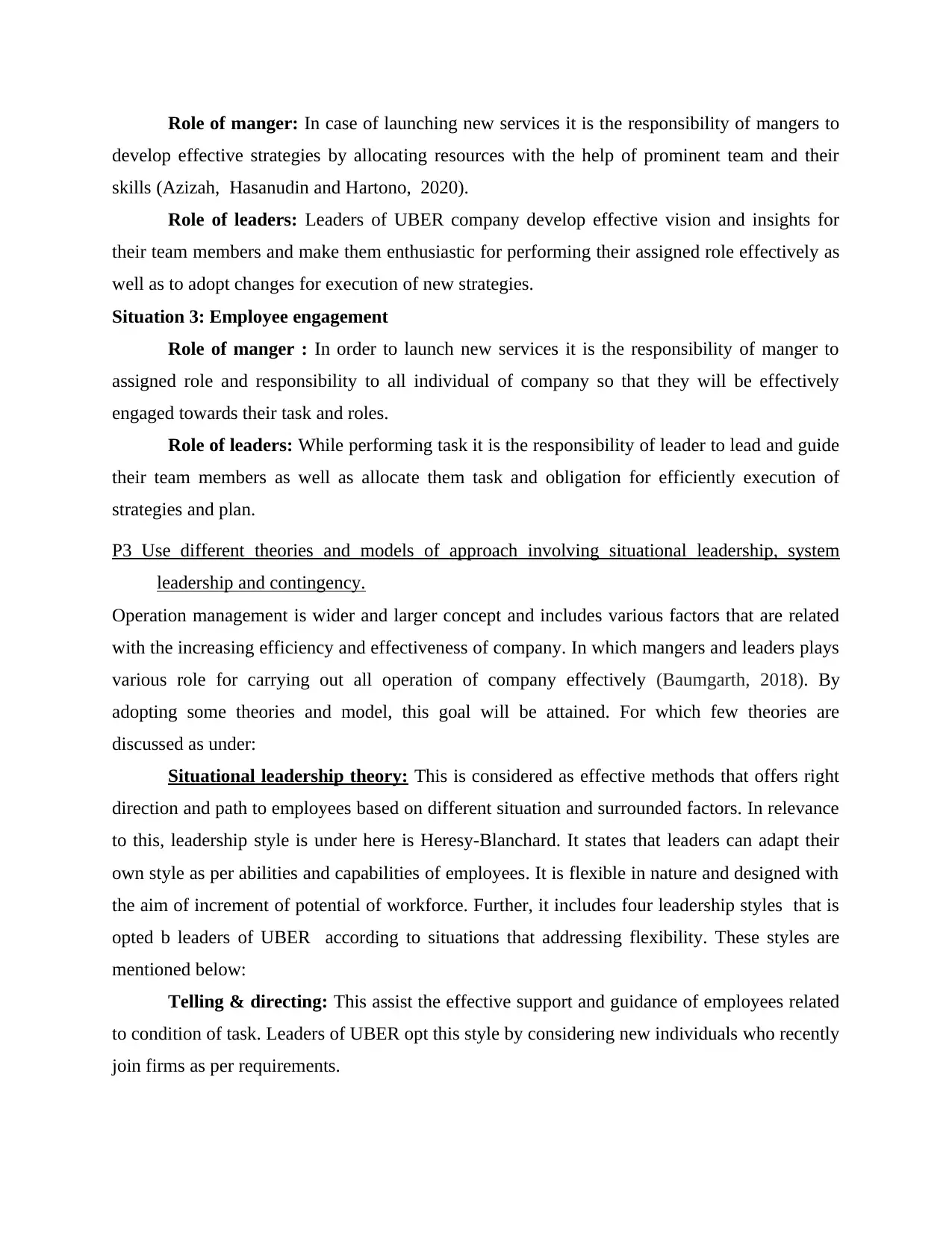
Role of manger: In case of launching new services it is the responsibility of mangers to
develop effective strategies by allocating resources with the help of prominent team and their
skills (Azizah, Hasanudin and Hartono, 2020).
Role of leaders: Leaders of UBER company develop effective vision and insights for
their team members and make them enthusiastic for performing their assigned role effectively as
well as to adopt changes for execution of new strategies.
Situation 3: Employee engagement
Role of manger : In order to launch new services it is the responsibility of manger to
assigned role and responsibility to all individual of company so that they will be effectively
engaged towards their task and roles.
Role of leaders: While performing task it is the responsibility of leader to lead and guide
their team members as well as allocate them task and obligation for efficiently execution of
strategies and plan.
P3 Use different theories and models of approach involving situational leadership, system
leadership and contingency.
Operation management is wider and larger concept and includes various factors that are related
with the increasing efficiency and effectiveness of company. In which mangers and leaders plays
various role for carrying out all operation of company effectively (Baumgarth, 2018). By
adopting some theories and model, this goal will be attained. For which few theories are
discussed as under:
Situational leadership theory: This is considered as effective methods that offers right
direction and path to employees based on different situation and surrounded factors. In relevance
to this, leadership style is under here is Heresy-Blanchard. It states that leaders can adapt their
own style as per abilities and capabilities of employees. It is flexible in nature and designed with
the aim of increment of potential of workforce. Further, it includes four leadership styles that is
opted b leaders of UBER according to situations that addressing flexibility. These styles are
mentioned below:
Telling & directing: This assist the effective support and guidance of employees related
to condition of task. Leaders of UBER opt this style by considering new individuals who recently
join firms as per requirements.
develop effective strategies by allocating resources with the help of prominent team and their
skills (Azizah, Hasanudin and Hartono, 2020).
Role of leaders: Leaders of UBER company develop effective vision and insights for
their team members and make them enthusiastic for performing their assigned role effectively as
well as to adopt changes for execution of new strategies.
Situation 3: Employee engagement
Role of manger : In order to launch new services it is the responsibility of manger to
assigned role and responsibility to all individual of company so that they will be effectively
engaged towards their task and roles.
Role of leaders: While performing task it is the responsibility of leader to lead and guide
their team members as well as allocate them task and obligation for efficiently execution of
strategies and plan.
P3 Use different theories and models of approach involving situational leadership, system
leadership and contingency.
Operation management is wider and larger concept and includes various factors that are related
with the increasing efficiency and effectiveness of company. In which mangers and leaders plays
various role for carrying out all operation of company effectively (Baumgarth, 2018). By
adopting some theories and model, this goal will be attained. For which few theories are
discussed as under:
Situational leadership theory: This is considered as effective methods that offers right
direction and path to employees based on different situation and surrounded factors. In relevance
to this, leadership style is under here is Heresy-Blanchard. It states that leaders can adapt their
own style as per abilities and capabilities of employees. It is flexible in nature and designed with
the aim of increment of potential of workforce. Further, it includes four leadership styles that is
opted b leaders of UBER according to situations that addressing flexibility. These styles are
mentioned below:
Telling & directing: This assist the effective support and guidance of employees related
to condition of task. Leaders of UBER opt this style by considering new individuals who recently
join firms as per requirements.
⊘ This is a preview!⊘
Do you want full access?
Subscribe today to unlock all pages.

Trusted by 1+ million students worldwide
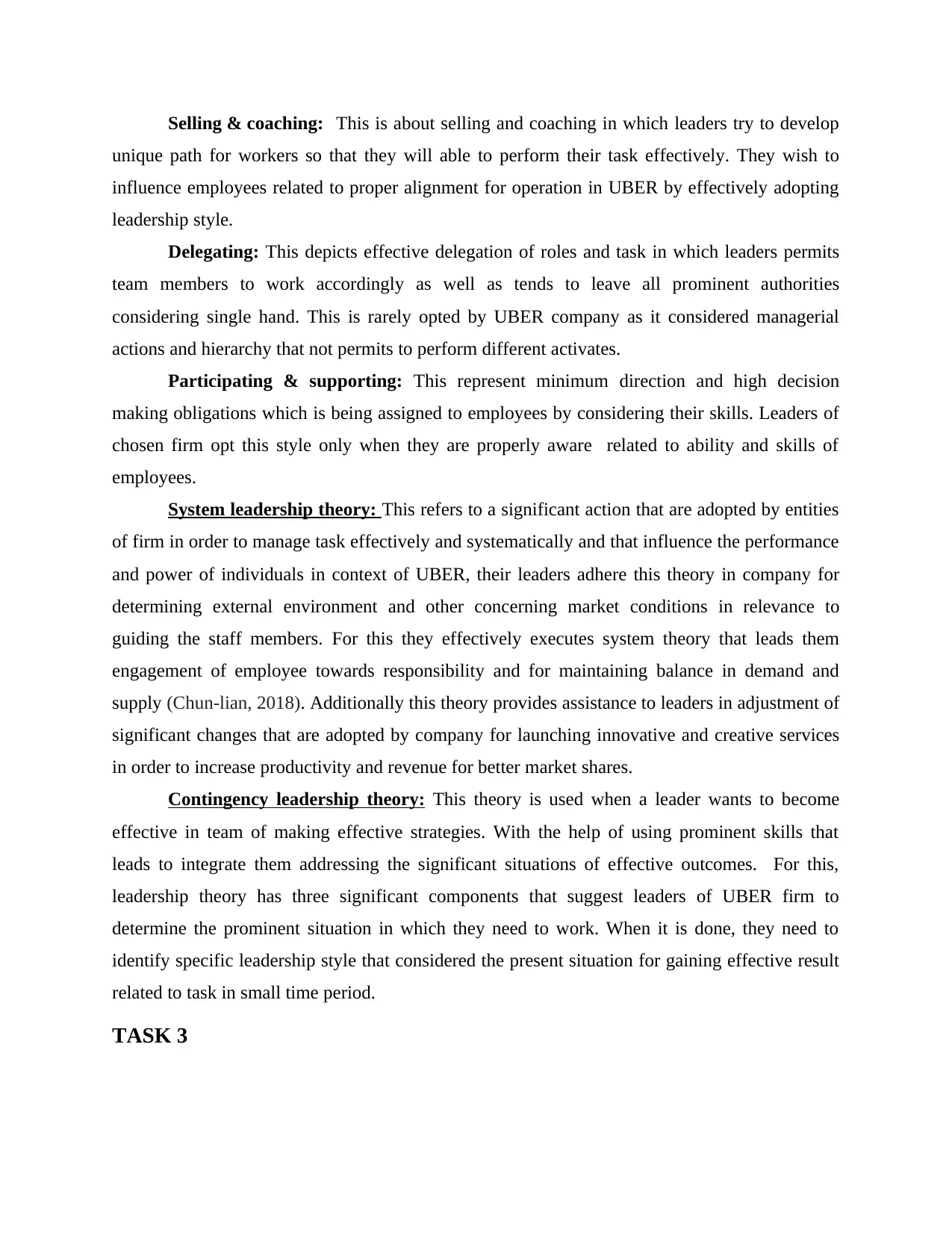
Selling & coaching: This is about selling and coaching in which leaders try to develop
unique path for workers so that they will able to perform their task effectively. They wish to
influence employees related to proper alignment for operation in UBER by effectively adopting
leadership style.
Delegating: This depicts effective delegation of roles and task in which leaders permits
team members to work accordingly as well as tends to leave all prominent authorities
considering single hand. This is rarely opted by UBER company as it considered managerial
actions and hierarchy that not permits to perform different activates.
Participating & supporting: This represent minimum direction and high decision
making obligations which is being assigned to employees by considering their skills. Leaders of
chosen firm opt this style only when they are properly aware related to ability and skills of
employees.
System leadership theory: This refers to a significant action that are adopted by entities
of firm in order to manage task effectively and systematically and that influence the performance
and power of individuals in context of UBER, their leaders adhere this theory in company for
determining external environment and other concerning market conditions in relevance to
guiding the staff members. For this they effectively executes system theory that leads them
engagement of employee towards responsibility and for maintaining balance in demand and
supply (Chun-lian, 2018). Additionally this theory provides assistance to leaders in adjustment of
significant changes that are adopted by company for launching innovative and creative services
in order to increase productivity and revenue for better market shares.
Contingency leadership theory: This theory is used when a leader wants to become
effective in team of making effective strategies. With the help of using prominent skills that
leads to integrate them addressing the significant situations of effective outcomes. For this,
leadership theory has three significant components that suggest leaders of UBER firm to
determine the prominent situation in which they need to work. When it is done, they need to
identify specific leadership style that considered the present situation for gaining effective result
related to task in small time period.
TASK 3
unique path for workers so that they will able to perform their task effectively. They wish to
influence employees related to proper alignment for operation in UBER by effectively adopting
leadership style.
Delegating: This depicts effective delegation of roles and task in which leaders permits
team members to work accordingly as well as tends to leave all prominent authorities
considering single hand. This is rarely opted by UBER company as it considered managerial
actions and hierarchy that not permits to perform different activates.
Participating & supporting: This represent minimum direction and high decision
making obligations which is being assigned to employees by considering their skills. Leaders of
chosen firm opt this style only when they are properly aware related to ability and skills of
employees.
System leadership theory: This refers to a significant action that are adopted by entities
of firm in order to manage task effectively and systematically and that influence the performance
and power of individuals in context of UBER, their leaders adhere this theory in company for
determining external environment and other concerning market conditions in relevance to
guiding the staff members. For this they effectively executes system theory that leads them
engagement of employee towards responsibility and for maintaining balance in demand and
supply (Chun-lian, 2018). Additionally this theory provides assistance to leaders in adjustment of
significant changes that are adopted by company for launching innovative and creative services
in order to increase productivity and revenue for better market shares.
Contingency leadership theory: This theory is used when a leader wants to become
effective in team of making effective strategies. With the help of using prominent skills that
leads to integrate them addressing the significant situations of effective outcomes. For this,
leadership theory has three significant components that suggest leaders of UBER firm to
determine the prominent situation in which they need to work. When it is done, they need to
identify specific leadership style that considered the present situation for gaining effective result
related to task in small time period.
TASK 3
Paraphrase This Document
Need a fresh take? Get an instant paraphrase of this document with our AI Paraphraser
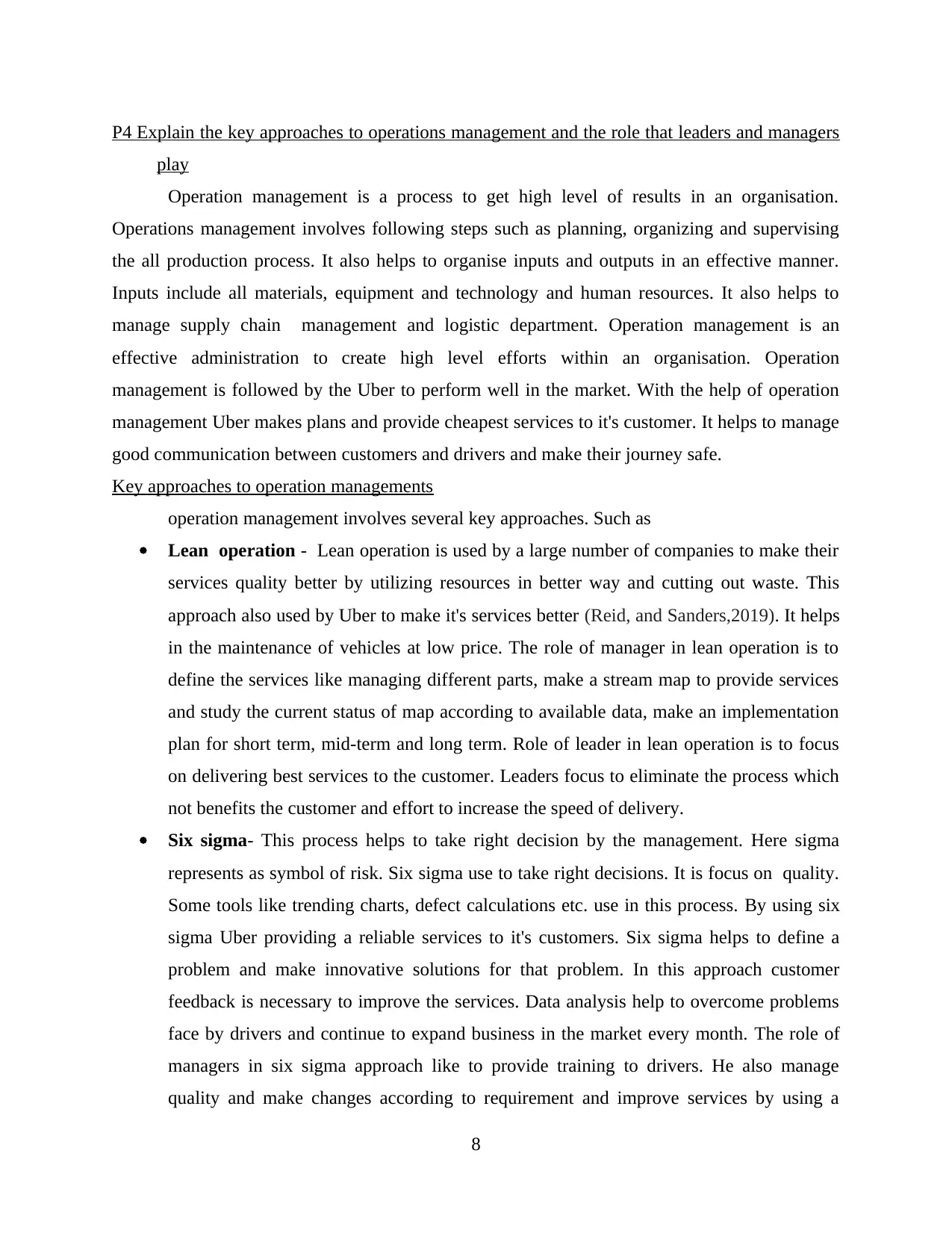
P4 Explain the key approaches to operations management and the role that leaders and managers
play
Operation management is a process to get high level of results in an organisation.
Operations management involves following steps such as planning, organizing and supervising
the all production process. It also helps to organise inputs and outputs in an effective manner.
Inputs include all materials, equipment and technology and human resources. It also helps to
manage supply chain management and logistic department. Operation management is an
effective administration to create high level efforts within an organisation. Operation
management is followed by the Uber to perform well in the market. With the help of operation
management Uber makes plans and provide cheapest services to it's customer. It helps to manage
good communication between customers and drivers and make their journey safe.
Key approaches to operation managements
operation management involves several key approaches. Such as
Lean operation - Lean operation is used by a large number of companies to make their
services quality better by utilizing resources in better way and cutting out waste. This
approach also used by Uber to make it's services better (Reid, and Sanders,2019). It helps
in the maintenance of vehicles at low price. The role of manager in lean operation is to
define the services like managing different parts, make a stream map to provide services
and study the current status of map according to available data, make an implementation
plan for short term, mid-term and long term. Role of leader in lean operation is to focus
on delivering best services to the customer. Leaders focus to eliminate the process which
not benefits the customer and effort to increase the speed of delivery.
Six sigma- This process helps to take right decision by the management. Here sigma
represents as symbol of risk. Six sigma use to take right decisions. It is focus on quality.
Some tools like trending charts, defect calculations etc. use in this process. By using six
sigma Uber providing a reliable services to it's customers. Six sigma helps to define a
problem and make innovative solutions for that problem. In this approach customer
feedback is necessary to improve the services. Data analysis help to overcome problems
face by drivers and continue to expand business in the market every month. The role of
managers in six sigma approach like to provide training to drivers. He also manage
quality and make changes according to requirement and improve services by using a
8
play
Operation management is a process to get high level of results in an organisation.
Operations management involves following steps such as planning, organizing and supervising
the all production process. It also helps to organise inputs and outputs in an effective manner.
Inputs include all materials, equipment and technology and human resources. It also helps to
manage supply chain management and logistic department. Operation management is an
effective administration to create high level efforts within an organisation. Operation
management is followed by the Uber to perform well in the market. With the help of operation
management Uber makes plans and provide cheapest services to it's customer. It helps to manage
good communication between customers and drivers and make their journey safe.
Key approaches to operation managements
operation management involves several key approaches. Such as
Lean operation - Lean operation is used by a large number of companies to make their
services quality better by utilizing resources in better way and cutting out waste. This
approach also used by Uber to make it's services better (Reid, and Sanders,2019). It helps
in the maintenance of vehicles at low price. The role of manager in lean operation is to
define the services like managing different parts, make a stream map to provide services
and study the current status of map according to available data, make an implementation
plan for short term, mid-term and long term. Role of leader in lean operation is to focus
on delivering best services to the customer. Leaders focus to eliminate the process which
not benefits the customer and effort to increase the speed of delivery.
Six sigma- This process helps to take right decision by the management. Here sigma
represents as symbol of risk. Six sigma use to take right decisions. It is focus on quality.
Some tools like trending charts, defect calculations etc. use in this process. By using six
sigma Uber providing a reliable services to it's customers. Six sigma helps to define a
problem and make innovative solutions for that problem. In this approach customer
feedback is necessary to improve the services. Data analysis help to overcome problems
face by drivers and continue to expand business in the market every month. The role of
managers in six sigma approach like to provide training to drivers. He also manage
quality and make changes according to requirement and improve services by using a
8
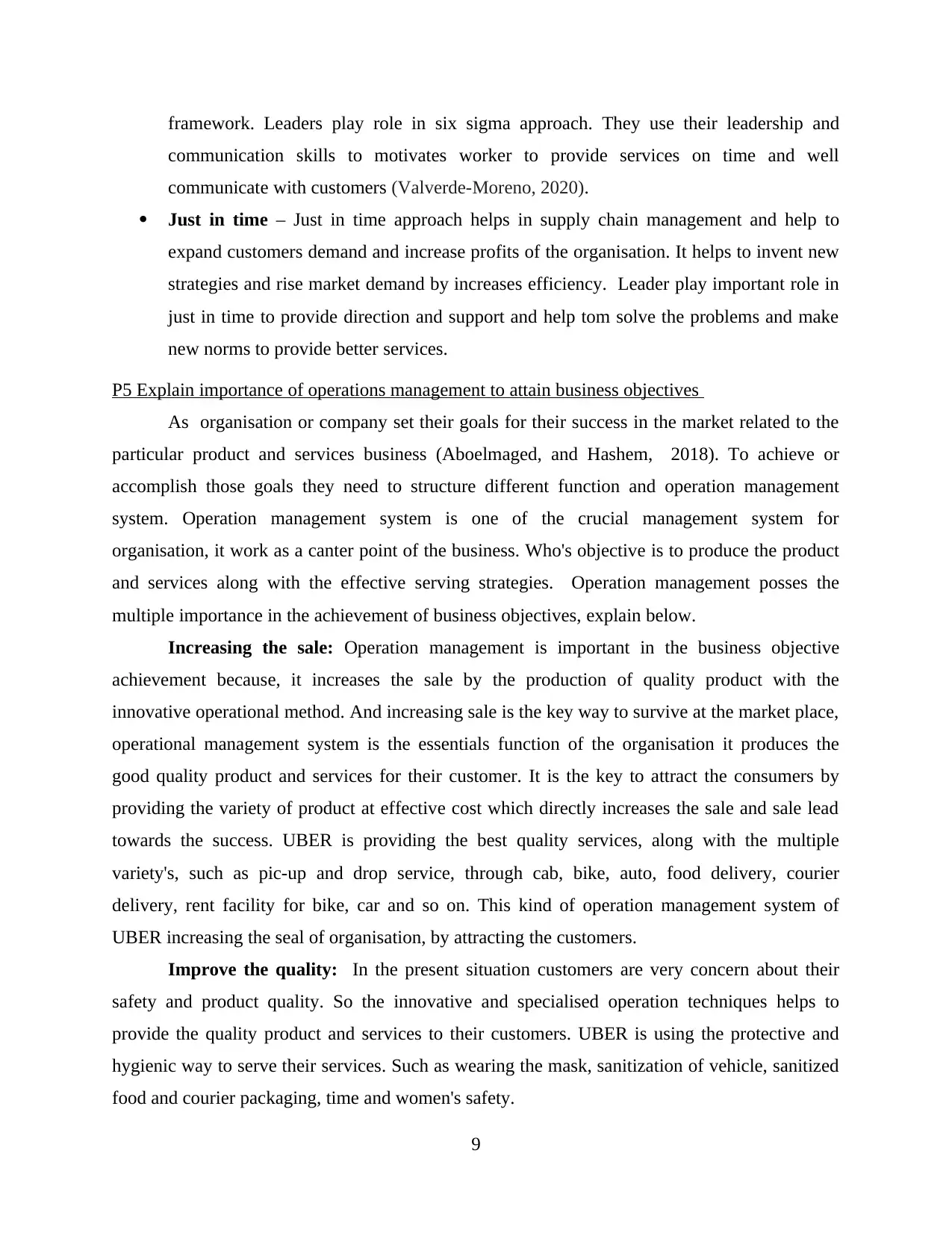
framework. Leaders play role in six sigma approach. They use their leadership and
communication skills to motivates worker to provide services on time and well
communicate with customers (Valverde-Moreno, 2020).
Just in time – Just in time approach helps in supply chain management and help to
expand customers demand and increase profits of the organisation. It helps to invent new
strategies and rise market demand by increases efficiency. Leader play important role in
just in time to provide direction and support and help tom solve the problems and make
new norms to provide better services.
P5 Explain importance of operations management to attain business objectives
As organisation or company set their goals for their success in the market related to the
particular product and services business (Aboelmaged, and Hashem, 2018). To achieve or
accomplish those goals they need to structure different function and operation management
system. Operation management system is one of the crucial management system for
organisation, it work as a canter point of the business. Who's objective is to produce the product
and services along with the effective serving strategies. Operation management posses the
multiple importance in the achievement of business objectives, explain below.
Increasing the sale: Operation management is important in the business objective
achievement because, it increases the sale by the production of quality product with the
innovative operational method. And increasing sale is the key way to survive at the market place,
operational management system is the essentials function of the organisation it produces the
good quality product and services for their customer. It is the key to attract the consumers by
providing the variety of product at effective cost which directly increases the sale and sale lead
towards the success. UBER is providing the best quality services, along with the multiple
variety's, such as pic-up and drop service, through cab, bike, auto, food delivery, courier
delivery, rent facility for bike, car and so on. This kind of operation management system of
UBER increasing the seal of organisation, by attracting the customers.
Improve the quality: In the present situation customers are very concern about their
safety and product quality. So the innovative and specialised operation techniques helps to
provide the quality product and services to their customers. UBER is using the protective and
hygienic way to serve their services. Such as wearing the mask, sanitization of vehicle, sanitized
food and courier packaging, time and women's safety.
9
communication skills to motivates worker to provide services on time and well
communicate with customers (Valverde-Moreno, 2020).
Just in time – Just in time approach helps in supply chain management and help to
expand customers demand and increase profits of the organisation. It helps to invent new
strategies and rise market demand by increases efficiency. Leader play important role in
just in time to provide direction and support and help tom solve the problems and make
new norms to provide better services.
P5 Explain importance of operations management to attain business objectives
As organisation or company set their goals for their success in the market related to the
particular product and services business (Aboelmaged, and Hashem, 2018). To achieve or
accomplish those goals they need to structure different function and operation management
system. Operation management system is one of the crucial management system for
organisation, it work as a canter point of the business. Who's objective is to produce the product
and services along with the effective serving strategies. Operation management posses the
multiple importance in the achievement of business objectives, explain below.
Increasing the sale: Operation management is important in the business objective
achievement because, it increases the sale by the production of quality product with the
innovative operational method. And increasing sale is the key way to survive at the market place,
operational management system is the essentials function of the organisation it produces the
good quality product and services for their customer. It is the key to attract the consumers by
providing the variety of product at effective cost which directly increases the sale and sale lead
towards the success. UBER is providing the best quality services, along with the multiple
variety's, such as pic-up and drop service, through cab, bike, auto, food delivery, courier
delivery, rent facility for bike, car and so on. This kind of operation management system of
UBER increasing the seal of organisation, by attracting the customers.
Improve the quality: In the present situation customers are very concern about their
safety and product quality. So the innovative and specialised operation techniques helps to
provide the quality product and services to their customers. UBER is using the protective and
hygienic way to serve their services. Such as wearing the mask, sanitization of vehicle, sanitized
food and courier packaging, time and women's safety.
9
⊘ This is a preview!⊘
Do you want full access?
Subscribe today to unlock all pages.

Trusted by 1+ million students worldwide
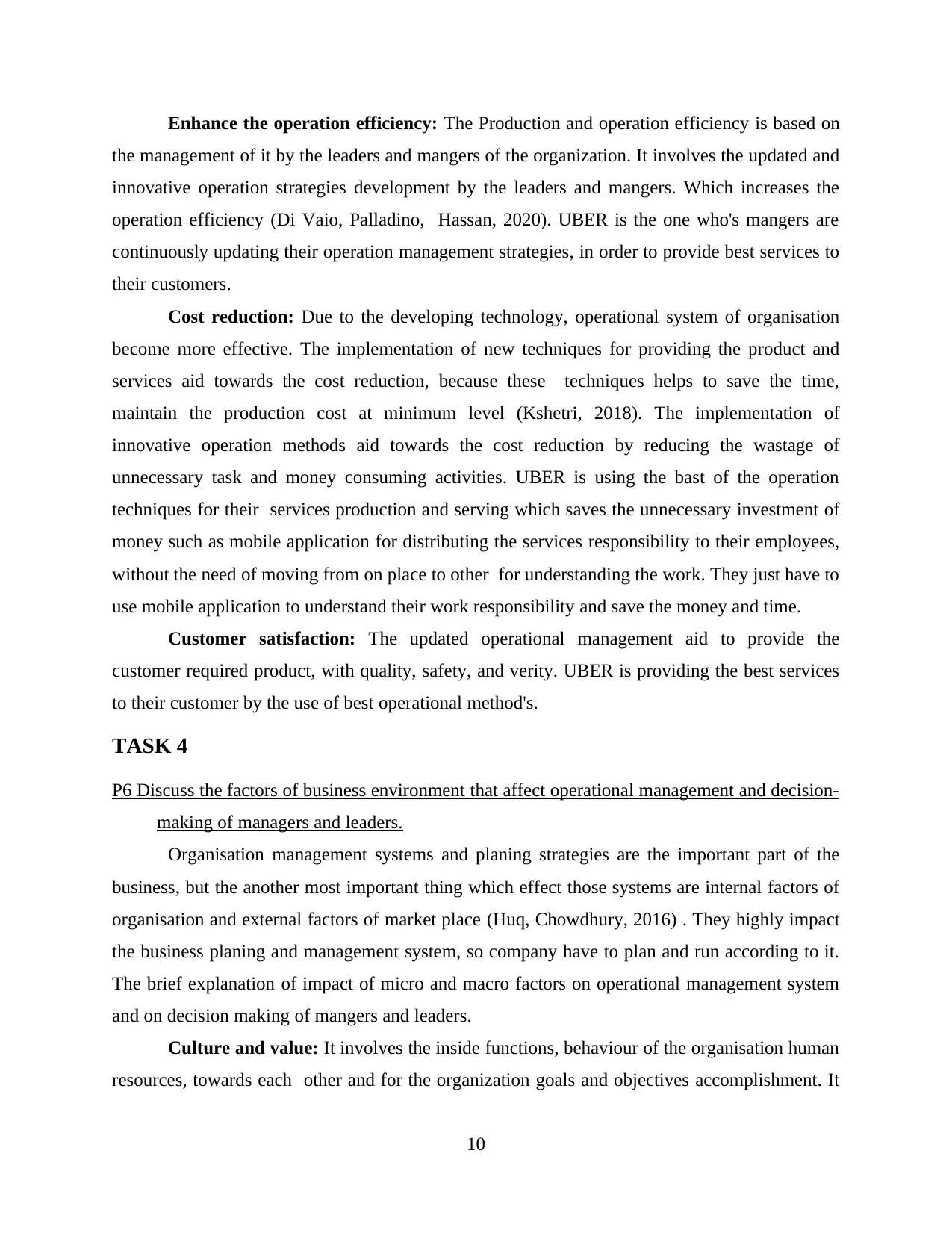
Enhance the operation efficiency: The Production and operation efficiency is based on
the management of it by the leaders and mangers of the organization. It involves the updated and
innovative operation strategies development by the leaders and mangers. Which increases the
operation efficiency (Di Vaio, Palladino, Hassan, 2020). UBER is the one who's mangers are
continuously updating their operation management strategies, in order to provide best services to
their customers.
Cost reduction: Due to the developing technology, operational system of organisation
become more effective. The implementation of new techniques for providing the product and
services aid towards the cost reduction, because these techniques helps to save the time,
maintain the production cost at minimum level (Kshetri, 2018). The implementation of
innovative operation methods aid towards the cost reduction by reducing the wastage of
unnecessary task and money consuming activities. UBER is using the bast of the operation
techniques for their services production and serving which saves the unnecessary investment of
money such as mobile application for distributing the services responsibility to their employees,
without the need of moving from on place to other for understanding the work. They just have to
use mobile application to understand their work responsibility and save the money and time.
Customer satisfaction: The updated operational management aid to provide the
customer required product, with quality, safety, and verity. UBER is providing the best services
to their customer by the use of best operational method's.
TASK 4
P6 Discuss the factors of business environment that affect operational management and decision-
making of managers and leaders.
Organisation management systems and planing strategies are the important part of the
business, but the another most important thing which effect those systems are internal factors of
organisation and external factors of market place (Huq, Chowdhury, 2016) . They highly impact
the business planing and management system, so company have to plan and run according to it.
The brief explanation of impact of micro and macro factors on operational management system
and on decision making of mangers and leaders.
Culture and value: It involves the inside functions, behaviour of the organisation human
resources, towards each other and for the organization goals and objectives accomplishment. It
10
the management of it by the leaders and mangers of the organization. It involves the updated and
innovative operation strategies development by the leaders and mangers. Which increases the
operation efficiency (Di Vaio, Palladino, Hassan, 2020). UBER is the one who's mangers are
continuously updating their operation management strategies, in order to provide best services to
their customers.
Cost reduction: Due to the developing technology, operational system of organisation
become more effective. The implementation of new techniques for providing the product and
services aid towards the cost reduction, because these techniques helps to save the time,
maintain the production cost at minimum level (Kshetri, 2018). The implementation of
innovative operation methods aid towards the cost reduction by reducing the wastage of
unnecessary task and money consuming activities. UBER is using the bast of the operation
techniques for their services production and serving which saves the unnecessary investment of
money such as mobile application for distributing the services responsibility to their employees,
without the need of moving from on place to other for understanding the work. They just have to
use mobile application to understand their work responsibility and save the money and time.
Customer satisfaction: The updated operational management aid to provide the
customer required product, with quality, safety, and verity. UBER is providing the best services
to their customer by the use of best operational method's.
TASK 4
P6 Discuss the factors of business environment that affect operational management and decision-
making of managers and leaders.
Organisation management systems and planing strategies are the important part of the
business, but the another most important thing which effect those systems are internal factors of
organisation and external factors of market place (Huq, Chowdhury, 2016) . They highly impact
the business planing and management system, so company have to plan and run according to it.
The brief explanation of impact of micro and macro factors on operational management system
and on decision making of mangers and leaders.
Culture and value: It involves the inside functions, behaviour of the organisation human
resources, towards each other and for the organization goals and objectives accomplishment. It
10
Paraphrase This Document
Need a fresh take? Get an instant paraphrase of this document with our AI Paraphraser
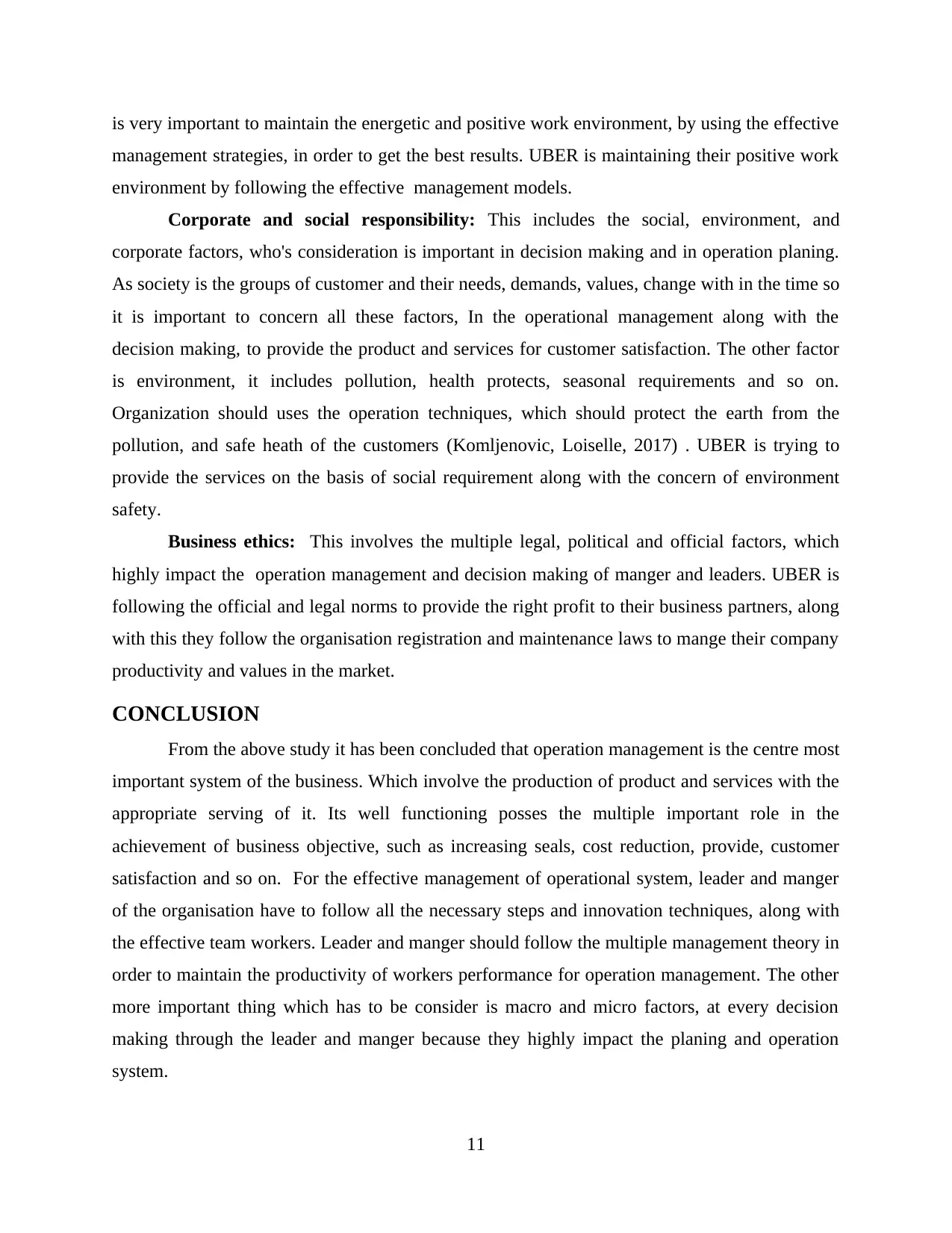
is very important to maintain the energetic and positive work environment, by using the effective
management strategies, in order to get the best results. UBER is maintaining their positive work
environment by following the effective management models.
Corporate and social responsibility: This includes the social, environment, and
corporate factors, who's consideration is important in decision making and in operation planing.
As society is the groups of customer and their needs, demands, values, change with in the time so
it is important to concern all these factors, In the operational management along with the
decision making, to provide the product and services for customer satisfaction. The other factor
is environment, it includes pollution, health protects, seasonal requirements and so on.
Organization should uses the operation techniques, which should protect the earth from the
pollution, and safe heath of the customers (Komljenovic, Loiselle, 2017) . UBER is trying to
provide the services on the basis of social requirement along with the concern of environment
safety.
Business ethics: This involves the multiple legal, political and official factors, which
highly impact the operation management and decision making of manger and leaders. UBER is
following the official and legal norms to provide the right profit to their business partners, along
with this they follow the organisation registration and maintenance laws to mange their company
productivity and values in the market.
CONCLUSION
From the above study it has been concluded that operation management is the centre most
important system of the business. Which involve the production of product and services with the
appropriate serving of it. Its well functioning posses the multiple important role in the
achievement of business objective, such as increasing seals, cost reduction, provide, customer
satisfaction and so on. For the effective management of operational system, leader and manger
of the organisation have to follow all the necessary steps and innovation techniques, along with
the effective team workers. Leader and manger should follow the multiple management theory in
order to maintain the productivity of workers performance for operation management. The other
more important thing which has to be consider is macro and micro factors, at every decision
making through the leader and manger because they highly impact the planing and operation
system.
11
management strategies, in order to get the best results. UBER is maintaining their positive work
environment by following the effective management models.
Corporate and social responsibility: This includes the social, environment, and
corporate factors, who's consideration is important in decision making and in operation planing.
As society is the groups of customer and their needs, demands, values, change with in the time so
it is important to concern all these factors, In the operational management along with the
decision making, to provide the product and services for customer satisfaction. The other factor
is environment, it includes pollution, health protects, seasonal requirements and so on.
Organization should uses the operation techniques, which should protect the earth from the
pollution, and safe heath of the customers (Komljenovic, Loiselle, 2017) . UBER is trying to
provide the services on the basis of social requirement along with the concern of environment
safety.
Business ethics: This involves the multiple legal, political and official factors, which
highly impact the operation management and decision making of manger and leaders. UBER is
following the official and legal norms to provide the right profit to their business partners, along
with this they follow the organisation registration and maintenance laws to mange their company
productivity and values in the market.
CONCLUSION
From the above study it has been concluded that operation management is the centre most
important system of the business. Which involve the production of product and services with the
appropriate serving of it. Its well functioning posses the multiple important role in the
achievement of business objective, such as increasing seals, cost reduction, provide, customer
satisfaction and so on. For the effective management of operational system, leader and manger
of the organisation have to follow all the necessary steps and innovation techniques, along with
the effective team workers. Leader and manger should follow the multiple management theory in
order to maintain the productivity of workers performance for operation management. The other
more important thing which has to be consider is macro and micro factors, at every decision
making through the leader and manger because they highly impact the planing and operation
system.
11
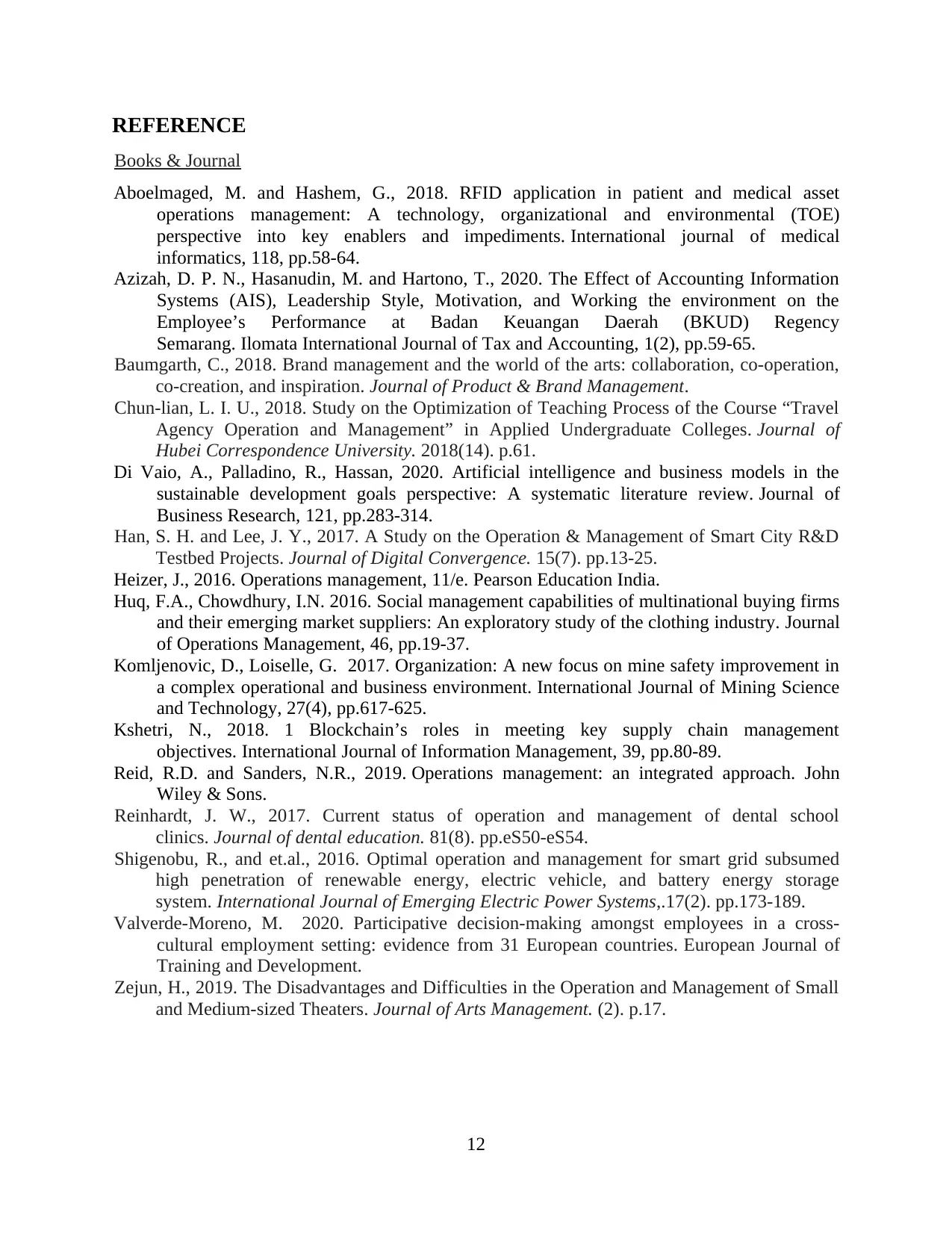
REFERENCE
Books & Journal
Aboelmaged, M. and Hashem, G., 2018. RFID application in patient and medical asset
operations management: A technology, organizational and environmental (TOE)
perspective into key enablers and impediments. International journal of medical
informatics, 118, pp.58-64.
Azizah, D. P. N., Hasanudin, M. and Hartono, T., 2020. The Effect of Accounting Information
Systems (AIS), Leadership Style, Motivation, and Working the environment on the
Employee’s Performance at Badan Keuangan Daerah (BKUD) Regency
Semarang. Ilomata International Journal of Tax and Accounting, 1(2), pp.59-65.
Baumgarth, C., 2018. Brand management and the world of the arts: collaboration, co-operation,
co-creation, and inspiration. Journal of Product & Brand Management.
Chun-lian, L. I. U., 2018. Study on the Optimization of Teaching Process of the Course “Travel
Agency Operation and Management” in Applied Undergraduate Colleges. Journal of
Hubei Correspondence University. 2018(14). p.61.
Di Vaio, A., Palladino, R., Hassan, 2020. Artificial intelligence and business models in the
sustainable development goals perspective: A systematic literature review. Journal of
Business Research, 121, pp.283-314.
Han, S. H. and Lee, J. Y., 2017. A Study on the Operation & Management of Smart City R&D
Testbed Projects. Journal of Digital Convergence. 15(7). pp.13-25.
Heizer, J., 2016. Operations management, 11/e. Pearson Education India.
Huq, F.A., Chowdhury, I.N. 2016. Social management capabilities of multinational buying firms
and their emerging market suppliers: An exploratory study of the clothing industry. Journal
of Operations Management, 46, pp.19-37.
Komljenovic, D., Loiselle, G. 2017. Organization: A new focus on mine safety improvement in
a complex operational and business environment. International Journal of Mining Science
and Technology, 27(4), pp.617-625.
Kshetri, N., 2018. 1 Blockchain’s roles in meeting key supply chain management
objectives. International Journal of Information Management, 39, pp.80-89.
Reid, R.D. and Sanders, N.R., 2019. Operations management: an integrated approach. John
Wiley & Sons.
Reinhardt, J. W., 2017. Current status of operation and management of dental school
clinics. Journal of dental education. 81(8). pp.eS50-eS54.
Shigenobu, R., and et.al., 2016. Optimal operation and management for smart grid subsumed
high penetration of renewable energy, electric vehicle, and battery energy storage
system. International Journal of Emerging Electric Power Systems,.17(2). pp.173-189.
Valverde-Moreno, M. 2020. Participative decision-making amongst employees in a cross-
cultural employment setting: evidence from 31 European countries. European Journal of
Training and Development.
Zejun, H., 2019. The Disadvantages and Difficulties in the Operation and Management of Small
and Medium-sized Theaters. Journal of Arts Management. (2). p.17.
12
Books & Journal
Aboelmaged, M. and Hashem, G., 2018. RFID application in patient and medical asset
operations management: A technology, organizational and environmental (TOE)
perspective into key enablers and impediments. International journal of medical
informatics, 118, pp.58-64.
Azizah, D. P. N., Hasanudin, M. and Hartono, T., 2020. The Effect of Accounting Information
Systems (AIS), Leadership Style, Motivation, and Working the environment on the
Employee’s Performance at Badan Keuangan Daerah (BKUD) Regency
Semarang. Ilomata International Journal of Tax and Accounting, 1(2), pp.59-65.
Baumgarth, C., 2018. Brand management and the world of the arts: collaboration, co-operation,
co-creation, and inspiration. Journal of Product & Brand Management.
Chun-lian, L. I. U., 2018. Study on the Optimization of Teaching Process of the Course “Travel
Agency Operation and Management” in Applied Undergraduate Colleges. Journal of
Hubei Correspondence University. 2018(14). p.61.
Di Vaio, A., Palladino, R., Hassan, 2020. Artificial intelligence and business models in the
sustainable development goals perspective: A systematic literature review. Journal of
Business Research, 121, pp.283-314.
Han, S. H. and Lee, J. Y., 2017. A Study on the Operation & Management of Smart City R&D
Testbed Projects. Journal of Digital Convergence. 15(7). pp.13-25.
Heizer, J., 2016. Operations management, 11/e. Pearson Education India.
Huq, F.A., Chowdhury, I.N. 2016. Social management capabilities of multinational buying firms
and their emerging market suppliers: An exploratory study of the clothing industry. Journal
of Operations Management, 46, pp.19-37.
Komljenovic, D., Loiselle, G. 2017. Organization: A new focus on mine safety improvement in
a complex operational and business environment. International Journal of Mining Science
and Technology, 27(4), pp.617-625.
Kshetri, N., 2018. 1 Blockchain’s roles in meeting key supply chain management
objectives. International Journal of Information Management, 39, pp.80-89.
Reid, R.D. and Sanders, N.R., 2019. Operations management: an integrated approach. John
Wiley & Sons.
Reinhardt, J. W., 2017. Current status of operation and management of dental school
clinics. Journal of dental education. 81(8). pp.eS50-eS54.
Shigenobu, R., and et.al., 2016. Optimal operation and management for smart grid subsumed
high penetration of renewable energy, electric vehicle, and battery energy storage
system. International Journal of Emerging Electric Power Systems,.17(2). pp.173-189.
Valverde-Moreno, M. 2020. Participative decision-making amongst employees in a cross-
cultural employment setting: evidence from 31 European countries. European Journal of
Training and Development.
Zejun, H., 2019. The Disadvantages and Difficulties in the Operation and Management of Small
and Medium-sized Theaters. Journal of Arts Management. (2). p.17.
12
⊘ This is a preview!⊘
Do you want full access?
Subscribe today to unlock all pages.

Trusted by 1+ million students worldwide
1 out of 12
Related Documents
Your All-in-One AI-Powered Toolkit for Academic Success.
+13062052269
info@desklib.com
Available 24*7 on WhatsApp / Email
![[object Object]](/_next/static/media/star-bottom.7253800d.svg)
Unlock your academic potential
Copyright © 2020–2026 A2Z Services. All Rights Reserved. Developed and managed by ZUCOL.





